On Wednesday, Stephen Wolfe, author of “The Case for Christian Nationalism,” claimed on Twitter he didn’t know who Emmett Till was until he recently googled his name. He then commented: “Yea I’m supposed to care about some 1955 event that all the libs care about. Their minds are captured.”
Till was a 14-year-old, five-foot-four-inches Black boy from Chicago who, while visiting rural Mississippi, was beaten to death, shot, tied to a 70-pound fan and thrown into a river by two white men. His offense was reputedly to have whistled at a white woman. A local all-white jury quickly acquitted the killers, who openly boasted of their crime. Till’s mother demanded his body be returned to Chicago, where his disfigured face was displayed before thousands of mourners.
The national outrage helped fuel the rise of the civil rights movement. Rosa Parks attended a solidarity rally for Till a few months later in Montgomery, Alabama, where young Martin Luther King Jr spoke. Soon afterwards she was famously arrested for defying segregation on a public bus.
Unreal pic.twitter.com/0WFFccclZm
— Rachel Ferguson (@LibertyEthics) July 26, 2023
So yes, Till was a teenage nobody whose brutal murder ultimately helped transform America. More than just “libs” care. The murders of nobodies often signify a great deal. The torture and unjust execution of an obscure Jewish preacher in a Roman province two thousand years ago transformed the world. In God’s eyes, nobodies are often very important, ultimately superseding many supposed somebodies.
Tom Holland’s Dominion: How the Christian Revolution Remade the World describes how the Gospel preached by that obscure Jewish preacher remarkably made nobodies somebodies. He recalls Blandina, a teenage slave girl in Lyon, France, tortured and killed because of her Christian faith in 177. She was merely a “slight, frail, despised woman,” who endured her sufferings with remarkable faith, for which she became an honored saint in the early church. “Set among the elite of heaven, seated directly within the splendor of God’s radiant palace, ahead of those who in the fallen world had been her immeasurable superiors, [she] was a potent illustration of the mystery that lay at the heart of the Christian faith,” Holland recounts. Blandina’s owner, a wealthy Christian woman, was also martyred in the Lyon arena. But her name is lost to history. In the economy of God, it’s the last who shall be first. “Those things reckoned by men low, and invisible, and contemptible, are precisely what God ranks as deserving of great glory,” wrote Irenaeus, a Lyon priest who later became a bishop and saint.
Your tax-deductible gift helps our journalists report the truth and hold Christian leaders and organizations accountable. Give a gift of $30 or more to The Roys Report this month, and you will receive a copy of “Baptistland: A Memoir of Abuse, Betrayal, and Transformation” by Christa Brown. To donate, click here.
The elevation of nobodies into somebodies is a unique gift of Christianity to the world. All societies naturally esteem the rich, the powerful, the very strong, the very beautiful, the brilliant, and the people who sparkle. Ordinary people, especially if they are poor, unattractive, inarticulate, lacking in influence, are typically overlooked, or even despised. But the Bible says God looks at the heart, and God rejoices to elevate the despised over the mighty, to humble proud humanity, and to reveal His own glory. As John Wesley wrote, the people God uses most powerfully are often “the filth and off scouring of the world.”
Christianity’s elevation of the lowly has fueled centuries of charity, philanthropy, humanitarianism, and social reform. The weak and the vulnerable are no longer seen as the inconsequential natural servants of the strong, rich, and mighty. There is in God’s view an equality among all, and even a special preference for the humble and despised. In Gospel-influenced societies there is even an exaltation of victims that would have shocked pagan societies, who disdained victims as losers. But Christianity worships a Victim who willingly sacrificed Himself. Many of His followers have been victims, including the Lyon slave girl Blandina.
In contemporary Western culture, the obsession with victimhood is often tiresome. There is now a glorification and power in victimhood. Self-professed victims get special attention and rights. We are victims too! We are not privileged! The ancient philosophers would be stunned by this turnaround. Nobody in ancient Rome or Athens, or ancient China, or prehistoric Africa or America, was seeking power through victimhood. Victims were at the bottom. They would have asked: who wants to be there, even rhetorically?
Tiresome as it sometimes is, our modern partiality to victims is a legacy of Christianity. It motivates us to at least seem to care about overlooked people. Despite all the hypocrisy and exploitation of the title, often by people who are themselves privileged, we can give thanks that in a Gospel-influenced society, victims matter. The lowly are in theory no less important than the mighty. This vision at least tries to approximate God’s Kingdom.
Mocking genuine victims hearkens to a more brutal, pre-Christian ethos in which strength and not lowliness is esteemed. Emmett Till was a brash Chicago teenage boy who didn’t know his place in the deep South, for which he was murdered, with no consequences for his killers. Who cares? Any sympathy for such a victim itself signals weakness, according to a natural pagan perspective.
Stephen Wolfe’s book The Case for Christian Nationalism extolls a fantasy Calvinist confessional state in which the elect rule over the lost and reprobate. God’s reputed people have the power, and the people less favored are their subjects, living under their rules. Its vision of power over service isn’t very Christian. And its subjugation of some people over others based on their religion isn’t very nationalist. It certainly isn’t at all American.
But disdaining Emmett Till’s murder, and the civil rights revolution it helped unleash, as part of the wider ongoing, 2000-year-old Christian revolution of equality and dignity for all, is helpfully clarifying.
This commentary, which was originally appeared at Juicy Ecumenism and has been reprinted with permission, does not necessarily reflect the views of The Roys Report.
Mark Tooley is president of The Institute on Religion & Democracy.




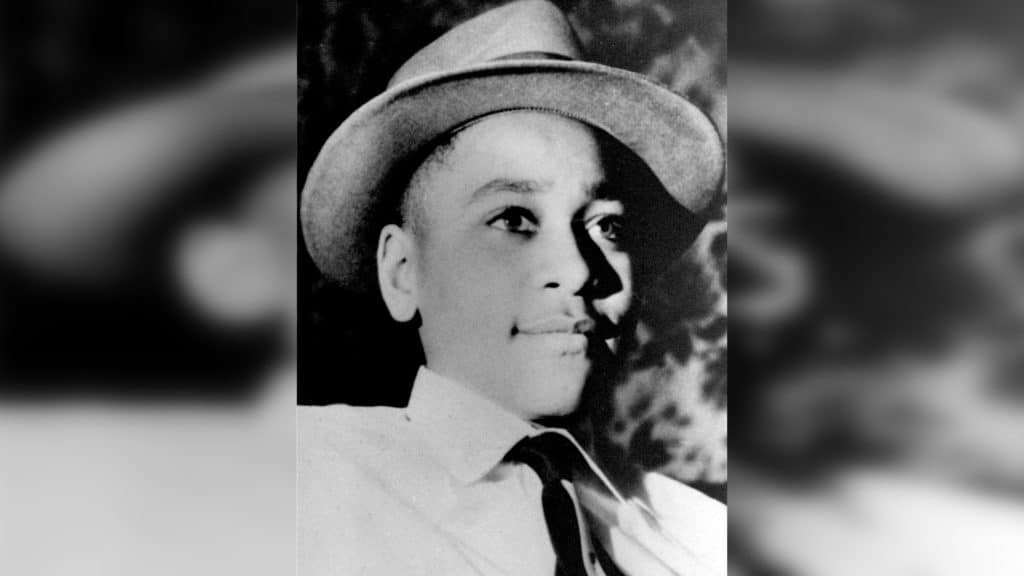
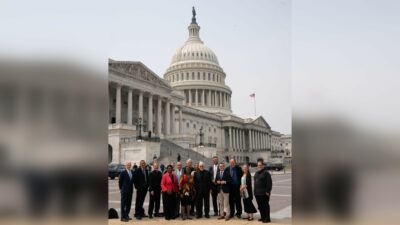
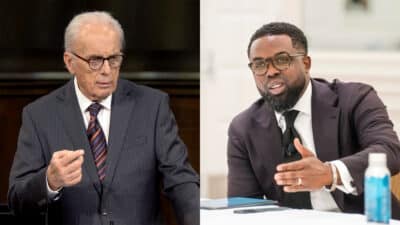

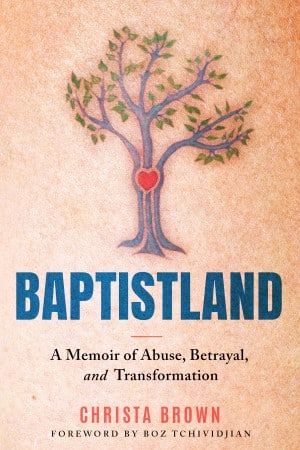

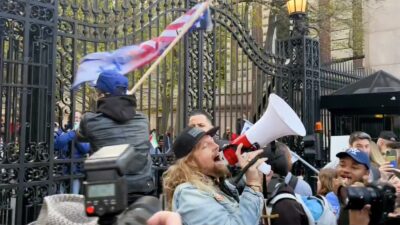









20 Responses
Very well written.
It’s a shame that we (America’s white ruling class) was never taught about Emitt Till, the Tulsa massacre or many of the atrocities perpetrated on minorities by our “Christian” American society.
What is worse is when a person claiming to be a representative of Christian America openly mocks those victims.
We can only hope that people will not throw out Christ along with the dirty Christianity that we see.
I knew about each horrific incident mentioned by the time I was 12 (1977). One only had to watch the news or go to the library. Roots was on TV for 2 weeks, and the conversation about it, went on for months. The narrative that these things weren’t public information is false. People just ignored it. Mao and Stalin starved and murdered tens of millions of their own people. This wasn’t “kept from us.” Sadly, we just shrugged it off.
These shameful attacks have not been taught in schools like they should have been.
‘A conspiracy of silence’: Tulsa Race Massacre was absent from schools for generations
Nuria Martinez-Keel
Oklahoman
May 26, 2021
The story on the tape couldn’t be real.
That’s what state Sen. Kevin Matthews thought as he watched a VHS film, given to him by his great-uncle, depicting a white mob destroying Tulsa’s Greenwood District.
Matthews, 61, was in his 30s at the time. He had grown up in Tulsa and graduated from Tulsa Public Schools.
But, he had never heard this story before
https://www.oklahoman.com/story/news/education/2021/05/26/oklahoma-history-black-wall-street-left-out-public-schools-tulsa-massacre-education/4875340001/
Thanks. Exhibit A in the case for teaching history with blemishes as well as beauties.
Once again, Wolfe in Sheep’s Clothing demonstrates a failure to grasp the defining characteristic of the Christian gospel, love. We well know what St John said in his letters about those who spout love for God whom they’ve not seen while failing to love those they have seen.
I’m 76. I never heard about what happened in the Black part of Tulsa until 1991. I wasn’t familiar about Emmett Till until I watched the first part of the PBS video series “Eyes on the Prize” around 1992. They weren’t part of high school U.S. History curriculum, anymore than a vast amount of other truly awful events in American history was. Black people knew about these things but if white parents didn’t tell their children – who would? No wonder there is mutual non-understanding. How many of you reading what I’m typing have heard of “The Negro Motorist Green Book” or “sundown towns”? If you were a Black person driving in the United States, that book and those towns were important to know about.
White people don’t know facts that Black people do. How many white people know how Black people affected by the horrendous Great Mississippi River Flood of 1927 were treated? How many of us are familiar with the Wikipedia lists of race riots in the United States?
Why does anyone pay attention to someone that tweets such profound ignorance? What is this? Tweet first and learn something later? Know-nothing, insensitive remarks are thrown out to an appreciative audience like raw meat to dogs. No wonder so many skeptics think that Christianity is skubalon, to use a word that Saint Paul used in Philippians 3:8.
Mr. Wolfe may or may not be a jerk, but it wasn’t for not knowing who Emmett Till was and what happened to him. Not everybody comes to the internet knowing everything there is to know. In a world where most people under age 40 can’t identify the men whose pictures appear on US currency, it’s not surprising. If he’s a jerk at all, it’s for asking a reasonable question in a way that was calculated to tick people off.
American history is littered with incidents that should never have happened. But they did. That is not the same thing as saying that the people alive today are personally responsible for every murder or injustice going back to the days of Jamestown. (You can find a list here, if you’re interested. https://tinyurl.com/24a8tv4b There are too many of them, and they make depressing reading, but similar incidents seem to be coming farther and farther apart.)
The fact is that 68 years on, black teenagers are no longer lynched with impunity, even in the most retrograde parts of the Deep South. At some point the question becomes, Other than showing a decent respect toward the memory of the dead, what exactly are we being asked to do in response to a murder that happened nearly 70 years ago?
To answer your question at the end of your comment, you should do exactly what this hate-filled man should have done about Emmett Till instead of Tweeting in the first place: Google it. Folks have responded to your question extensively online. (Micah 6:8 also responds to your query.) Very easy to access–all it takes is some curiosity, humility, and willingness to learn.
You have not answered my question.
I’ve been aware of the events surrounding the death of Emmett Till for a number of years. What I refuse to do is to accept personal responsibility for something that happened in the same year that I was born. I try to follow Micah 6;8, just as Jesus told all of His followers to follow the rest of the Bible.
My question remains: What exactly are you asking me to do? Do you want all white people to sit in the back of the bus? Or step off the sidewalk when they see a black person approach on the street? Do you want to assign a special drinking fountain for white people to use, or require them to sit special section at the lunch counter? What is the goal here? And how will we know when that goal is achieved? Because otherwise, it’s never going to be enough and the cycle continues.
I believe people were hoping that a man that claims to know the Lord would show some respect or reverence to the solemn truth that an image-bearer of God was brutally murdered. This would be in line with the characteristics we are called to be if we are followers of Jesus. Rather, the man in question tweeted a flippant, heartless response that should give anyone pause.
Ms. Short: Not that I think it will help, but I’ll rephrase. What level of guilt do you believe I bear for the death of Emmett Till, and how can I expiate that guilt?
So far, no one seems to even acknowledge the question, let alone provide an answer.
It’s very concerning that simply asking for an honorable recognition of both the horrors of the Till murder and its impact on the civil rights movement is warranting such flippant, sarcastic responses from professing Christians.
It’s troubling we need to ask for what is obvious on this. Do you need instructions on “what to do” on MLK Day or why we learn about his assassination? Would you go to a family whose child was murdered and say “well what do you want me to do? Why are you telling us this?”
Why is this so hard? Isn’t this just about basic respect? Whew, this hurts my heart.
Hello Marin,
Unfortunately, we cannot force others to share our heroes from the past.
The Emmett Till story is a major tragedy, in my opinion. It boggles the mind that ANYBODY could murder a teenager simply because of his skin color. Disgraceful, atrocious, and disgusting are words that come to mind. You can be sure the perpetrators will pay a price when they stand before God. Indeed, you can count on it. The fact they “got away with it” on earth is maddening to me.
That said, we cannot force others to share our heroes from the past. Many view George Floyd as a hero, but many view him as a drug-addicted convict who threatened a pregnant woman with a knife.
It is not possible to legislate public opinion and feelings. Putting up statues and tearing down statues rarely alters peoples’ opinions. Creating holidays rarely alters peoples’ opinions. Eliminating holidays rarely alters peoples’ opinions.
So, even though the Emmett Till story is a critical component of the Civil Rights Movement, many don’t really care. It is not part of their story.
Well said, Marin. Thank you.
“That is not the same thing as saying that the people alive today are personally responsible for every murder or injustice going back to the days of Jamestown.”
This is the exact same strawman conservatives trot out every time anyone dares to talk about America’s racist past. Nobody has ever claimed that the people alive today are personally responsible for every murder of injustice that’s happened in the past. It is ludicrous exaggeration designed to avoid having to discuss the subject altogether.
But certainly one does have to question why the more sordid parts of the country’s past are buried so deep that they disappear from all but the most specialized of academic textbooks. I had no idea there was a Black Wall Street in Tulsa that was destroyed when white men massacred the black people who had created it until I saw the episode of Watchmen, a superhero TV show on HBO, set during the event.
I am white, and I have never ever been made to feel that I was personally responsible for events that happened before I was born, but we all bear the responsibility for seeing that such events never happen again, and the only way we can do that is if we know what happened in the past.
This is why it is important to teach Black history in schools (glaring hard at Florida and Moms of Liberty).
Black history is American history.
Cynthia –
I do agree you cannot force anyone to share our heroes. We all have our own heroes, some probably more known than others.
But just because someone isn’t your hero doesn’t mean the mention of their name should warrant flippant sarcastic responses; that is what this article is about and some of the comments reflect. Your mom may be your hero – if I don’t know her (as Mr Wolfe says he did not know of Till), I wouldn’t see that as a reason to ask disparaging questions or make flippant remarks. Heck, I definitely don’t see Confederate leaders as heroes worthy of honor as they are around the south. And you know what? When there are words or ceremonies that honor them, I just respectfully keep my mouth shut.
What happened to “if you can’t say something nice, don’t say anything at all?”
Marin,
Here is the response from Stephen Wolfe:
“Yea I’m supposed to care about some 1955 event that all the libs care about. Their minds are captured.”
What I deduce from these sentences is a very insensitive man who seems to think it’s okay to belittle others based on their affiliation with liberals. He likely finds anyone and anything connected to liberals disdainful.
Which begs the question…why would we care what someone with such a low opinion of others thinks? Why not just ignore his ignorance? Why write an article about it?
Publicity often feeds the beast. Perhaps, instead of cutting him down, we should say nothing at all and completely ignore him.
And I agree. We don’t need to share heroes, but we do need to share mutual respect.
Cynthia –
I agree with much of what you say. Mr Wolfe’s post can be translated as “trolling” for attention; no response likely would have led him to move on to his next “target.” I think his post is warranting reaction because Mr Wolfe is a self-professed Christian whose public persona is rooted in him being very vocal – even writing a book – about his faith as a proud Christian nationalist. (I personally believe Christian nationalism twists scripture, but that’s a whole other topic).
Under such circumstances, I do think it’s appropriate for Christians to publicly reject and distance ourselves from such remarks. When we are quiet, we risk those who are the “loudest” being mistaken for representing us – or that our silence is agreement.
Same for what happens politically – those with the loudest voices are often the most extreme; and because few are willing to challenge and/or silence them, those loud voices are viewed as representing the views of the entire base. (As you’ve seen on here, I often correct HORRIBLE misrepresentations of stances that are often rooted in the views of whoever has hollered the loudest)
Marin,
You have a point. If we don’t speak up, it might be misinterpreted by others to mean we agree with Mr. Wolfe’s position. And we definitely do not!!!
James 3:10:
“Out of the same mouth come praise and cursing. My brothers and sisters, this should not be.”
Claiming, on the one hand, to be a “Christian” and then turning around and speaking with such disrespect about the death of a Black teenager,,,
That’s not how we are supposed to represent Christ, is it? So, I have to conclude there is something seriously amiss with the “Christianity” Mr. Wolfe claims.
I stand with you on this one. I just didn’t want to give such disrespect more publicity by discussing it. As always, he will have to give an account to his Maker some day.